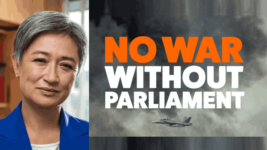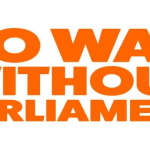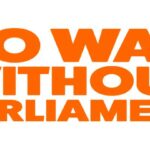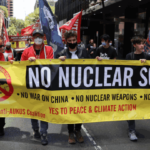Wong Rules Out War Powers Reform, Despite Parliamentary Inquiry Underway

At its March 2021 national conference, federal Labor determined that, if elected into government, it would hold a parliamentary inquiry into whether war powers should be a whole-of-parliament decision and not, as is the case now, the choice of the prime minister and a few cabinet ministers.
Comments made in the Senate by foreign affairs minister Penny Wong on 8 February, however, reveal that while the Albanese government-established inquiry into international armed conflict decision-making is underway, her party isn’t really contemplating making the long called for reform.
Right now, the PM and a handful of Australian ministers decide on whether our nation will enter into an overseas conflict. And the inquiry is considering whether that vote should be put to both chambers of parliament, which, in turn, involves consulting the constituency.
“The executive should account to the parliament for such a decision,” Wong said in response to a question put by Greens Senator Jordon Steele-Johns. “But it is, in our view, important for the security of the country that that remains a power and prerogative of the executive.”
This is not the first time a member of the Albanese cabinet has suggested the result of the inquiry is a foregone conclusion either, as defence minister Richard Marles, who established the review, wrote to the committee last October suggesting that it should not rule in favour of war powers reform.
Steeped in a colonial past
The National Security Committee decides on whether Australia enters into a foreign theatre of war.
Today, this committee is comprised of nine ministers: Anthony Albanese, Richard Marles, Penny Wong, Jim Chalmers, Chris Bowen, Mark Dreyfus, Clare O’Neil, Katy Gallagher and Pat Conroy.
This practice of putting the decision to the war cabinet was inherited from Britain, where it was based upon a centuries-old tradition that involved the ruling monarch alone declaring whether the country would enter into conflict.
Steele-Johns introduced war powers reform legislation into parliament in 2020, and following the establishment of the 47th Parliament of Australia under Albanese, the Greens senator reintroduced his bill on 27 July last year.
This is his party’s third such bill tabled, and this legislation has been produced in the wake of the Australian Democrats having entered its own three bills attempting to bring the practice to an end, with the first such legislation drafted in 1985.
Engaging the public
Established in 2012, Australians for War Powers Reform is focused on making the decision on whether the nation should enter into a foreign conflict, one that is made by the entire parliament.
In a press release on the day following Wong’s comments, AWPR said the war cabinet always informs parliament after the decision to enter into war has been made, and by that stage, any forthcoming debate isn’t able to impact it.
“Under that system, Australia has backed the US in successive wars, all of them disastrous: in Vietnam, Afghanistan, Iraq and Syria,” the AWPR statement reads, adding that the debate is all the more pertinent now that the rhetoric around war with China is mounting.
And the reform organisation further outlines that of the 111 submissions made to the war power reforms inquiry, 94 were in favour of the change, yet they’re set to be ignored now.
Indeed, when AWPR and others heralded Labor for pledging to hold the review once in power, they weren’t expecting that the inquiry was going to be a pretence, and that key ministers would make periodic announcements to ensure any detractors that maintaining the status quo is a given.







